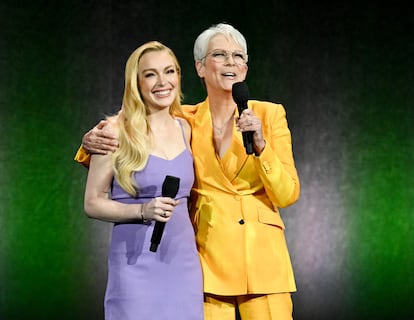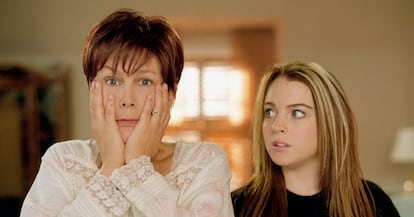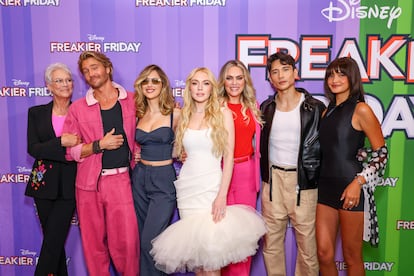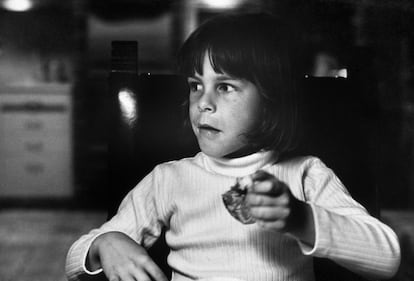Jamie Lee Curtis: "We're going to have to take to the streets again to fight like we did for civil rights."

Jamie Lee Curtis is Hollywood aristocracy and, at the same time, the least likely star to stretch her pinky finger imaginable. Winner of her first Oscar just two years ago despite her long career (for Everything at Once Everywhere), she doesn't hesitate now to launch into a comedy that will break the box office, reprising a role that cleverly introduced her to new generations in 2003. Two decades later, she returns to play Dr. Tess Coleman in Freaky Friday (also known as Freaky Friday ), Anna's (Lindsay Lohan) mother, and now, also Harper's (Julia Butters) grandmother in Freaky Friday Again , which will be released in theaters on August 8. Kind and polite, she stretches out her answers, gives a little more time than agreed upon, and gives hugs at the end of the conversation.
In her yellow suit, Curtis, 66, looks happy. She admits she's happy, half-joking, not having to face another conversation with an influencer : "Because you're a journalist and you're not going to ask me to change places, or ask me what I'm wearing, or what something means, and I'm going to have to tell you things that mean nothing... so I'm very happy." Curtis's sincerity is legendary ; she's been on sets since she was a baby, being the daughter of two legends like Tony Curtis and Janet Leigh, and with almost a hundred titles under her belt over a half-century of career. From horror to action to comedy, everything suits her, including the famous role she's now reprising: a mother who swaps her body and her life with her teenage daughter.
And she did so by her own decision. She's the one who decided that Freaky Freaky would get a sequel, and who even decided to produce it. She's the one who picked up the phone and brought Lindsay Lohan out of retirement —they've remained close friends over the past two decades—and handed it to Disney executives on a plate. A position diametrically opposed to that of the first film: back then, she found out she was going to be in it just a week before filming began.

This time, Curtis has taken the reins. “It all started when I was promoting Halloween, the last in the trilogy.” [ Halloween: The Finale , in 2022 ],” she explains, sitting in a luxurious Los Angeles hotel, early on a Sunday. “I was traveling all over the world, and in every corner of the planet the one question that kept coming up was about Freaky Friday, it was clear that everyone loved her. My response was, 'But Lindsay has to be old enough to be the mother of a teenager.' And someone said, 'She is.' She said she was 35, and it was like, 'Wait, 35? So she could have had a baby at 20! That's funny, come on!' I called Disney and said, 'It's time.' So all this hype, this huge global marketing campaign, this revival of teenage nostalgia, this new movie—is that her fault? A little bit. A tiny bit. “I take full responsibility,” he laughs, before adding further details. “I’d like to take full responsibility, but there’s a talented group of producers, our director, Nisha [Ganatra], the writers, and Disney itself. It’s a family.”
But was it necessary? There were requests from fans who, like Lohan, are closer to forty than high school, but is that enough? Why revive it? “Because it brings happiness. It makes people happy,” she states, very expressively. “Movies can challenge us with great dramas that tell us incredible aspects of history, of human behavior, that shed light, brilliant dramas. But comedies bring us joy. The world is a bit unstable right now. It feels like we're facing some political, social, environmental, spiritual, and societal upheaval. And what unites people? Laughter, tears, joy, family, nostalgia, security,” she asserts. For her, the film can become a safe space; Curtis says viewers tell her that after watching it, they call their mothers and daughters. “You can be sure it will connect you with your family.”

Feminism, less clearly present in the 2000s, is more obvious in this sequel. If it was already present in the first film, with its two protagonists, it is now reinforced with four women. The film presents Lohan as a single mother by choice, and Curtis as the grandmother who, also by choice, supports her. “Many women make that choice and don't have the support of their families. Others don't make it because they don't have that support and can't support a family. So, without a doubt, that's a feminist statement,” Curtis argues. “And it's produced by women, written by women, directed by a woman, and primarily stars women. Don't tell that to Mark Harmon,” she jokes, referring to the actor, who participates in the film and for the first time in more than 14 years takes on a role beyond that of the series NCIS .
The actress is pleased with the high participation of women in the film. “It conveys the feeling that a film centered on women can be made in the midst of an industry that is still clearly dominated by men,” she emphasizes. Although she acknowledges that there has been progress since she started in the business half a century ago. Back then, “there were no women at all.” Perhaps there were makeup artists, “maybe a few in wardrobe, but usually not in design.” “Few in the technical world, few producers, basically no directors. And that is changing. Slowly, gradually, not as quickly as I would like, but changing.”

Born and raised in Los Angeles, Curtis suffered through the devastating fires last January, which nearly destroyed her home . This film is a true love letter to Los Angeles, her hometown and home to the film industry, which has been hit hard by the pandemic : cutbacks, natural disasters, and skyrocketing costs have forced many productions to relocate to other cities or countries. The actress acknowledges that being a producer has also given her an advantage in this regard. “In one of the first conversations I had with Disney, I told them, 'I'm not going to make this movie in Atlanta or Vancouver. If you want to make it, it has to be in California. The original was in California, and this one will be in California.' It was crucial for me,” she reveals.
It was also key for her to return to the same house where the first one was filmed. “It was the house we filmed in 22 years ago, in Pacific Palisades. We filmed in a lot of the same locations. Like you say, it's a love letter to Los Angeles: we're at the beach, in Hollywood, everywhere. But sadly, with the fires, that house in Pacific Palisades burned down on January 7th ,” she laments sadly. “It doesn't exist today; the house, the street, is a vacant lot,” she says. A tennis court that appears in the film also burned down. “There were a lot of losses, for the city and for a lot of people, catastrophic, not for me. But the film will live on forever. In 25 years, maybe those streets will look a little similar again... It's bittersweet, but I'm so glad that, being the boss, I insisted on shooting there.”

Curtis is a powerful advocate for her causes, speaking loudly and clearly in an often prudish industry, afraid that one word louder than another will penalize its stars. That's not her. That's why she hasn't hesitated to speak out against Donald Trump since the day he won. Then she said , "Stand up and fight." That was months ago. Does she still uphold that maxim? "Yes, but we should have stood up and fought a long time ago," she reflects. "America was born standing up and fighting."
So, is there enough fighting going on in your country, given the circumstances? You take a second, reflect, and say, “No… Probably not, no.” And you expand on your reflection: “But you can't fight every day. You can disagree every day, but there's a time for fighting, and we live in a country where you can fight politically. You can practice democracy simply by voting, supporting candidates, challenging authoritarian regimes.”

“But yes, we're going to have to go out on the streets more and more, as time goes on, like they're doing all over the world, to do the same thing we did with civil rights,” she continues. “In the US, we had to fight for civil rights, for women's rights. We're still fighting for women's rights. We're going to have to fight for trans rights, fight again for gay rights, for gay marriage. We're going to have to fight for all of that again. They're going to try to take it away from us. We're going to have to fight against it,” says the actress, who has a trans daughter who, as she has said, suffers constant threats . “Roe v. Wade,” she quotes, referring to the controversial repeal of abortion rights in 2022 , “we're going to have to fight again. It's in people's nature.” “I'm going to fight. The best way I know how, and you're going to fight yours. Are we doing it together?” she asks, her eyes wide open. And he stands up to end with a hug: “And everything will be okay.”
EL PAÍS





%3Aformat(jpg)%3Aquality(99)%3Awatermark(f.elconfidencial.com%2Ffile%2Fbae%2Feea%2Ffde%2Fbaeeeafde1b3229287b0c008f7602058.png%2C0%2C275%2C1)%2Ff.elconfidencial.com%2Foriginal%2Fbd2%2Fe90%2F7a5%2Fbd2e907a569ebeebd9fc42bee4511ddc.jpg&w=3840&q=100)